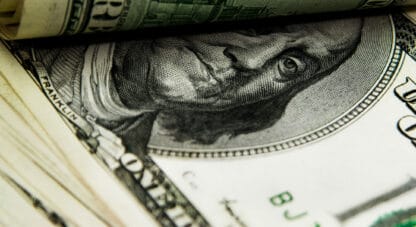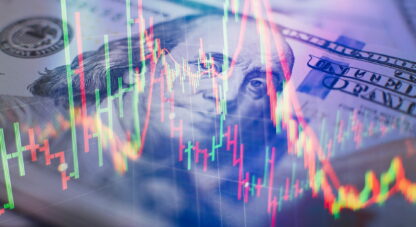About this week’s show:
- The real target: Diplomacy with China, North Korea, Russia, Iran…but NOT Assad
- Who benefits?...Syrian Rebels & ISIS, Turkey, Israel, politically threatened Merkel & Holland
- Gold mining corporate heads eagerly buy up their own stocks…What do they know?
The McAlvany Weekly Commentary
with David McAlvany and Kevin Orrick
“The theoretical future risk is no longer an issue which the modern investor is concerned with. Most individual investors – and listen, I would include professional managers in this, as well – they believe they don’t have to be early, and they believe that they will not be late. Investors believe things about themselves and their abilities which are quite often not true.”
– David McAlvany
Kevin: David, last Thursday night I saw that horrible clip over and over, of people who had been attacked with chemical weapons there in Syria. And of course, at that time Trump had sent 59 Tomahawk missiles in to attack one of Bashar Assad’s military bases. I have to admit, Dave, I had a mix of emotions. Part of me was just sick to see that anyone would use chemical weapons on anyone – women, children, men; it doesn’t matter. But on the other hand, there was part of me, Dave, that was feeling played. I really did. I felt like something was wrong. I smelled something in the wind that I felt like I was being manipulated.
David: Part of that is, I think, probably, the presentation of children’s bodies, and that being the primary thing that was looped over and over and over and over again. You have enough history, with media presentation and the idea of propaganda, that there are certain ways to stir people, and there are certain ways to create a context where the next action, or the next prescription, in light of what was just seen, is absolutely acceptable.
Kevin: One of my mixed emotions, Dave, was because I do want to have a president that can take action against enemies of the United States. So, I don’t want to pull that back either. It is just, it felt weird.
David: A friend of mine wrote an article in the Denver Post this last week. He basically said, “What’s the issue? Are we concerned here that it is chemical weapons? Or is it conventional weapons? Is there a distinction between the two, where somehow we feel more compelled to action, one versus the other?” Using conventional methods the death toll from the Assad regime averages 250 people per day, and that does include women and children. You have 80 people who died by chemical weapons and somehow we cross a line. What he points out is that there are estimates which range from 250,000 to 500,000 deaths in Syria in the last five years. So you can clearly say that it is not human life that we care about. We have already reached somewhere between a quarter and half a million people dead, and most of that is by conventional means. Somehow 80 and chemical weapons – what does that trigger in us? You have to say, “Well, what, then, really is going on here?”
Kevin: Dave, it is like an onion. There are layers and layers and layers you can look at. If we looked at the simple layer we would say, “Okay, well, we just took action to punish a bad guy.” Then you go a little bit deeper and you say, “Well, maybe there is a change in United States Middle Eastern policy. Definitely a change from what Trump had said the week before.” But you just said something in a meeting we had a few minutes ago, Dave, that I thought was important. Trump is a man of heart. He seems to act on his heart. There may be a lot more going on with this, but what I would like you to do is expound a little bit on what you were talking to us about because he is a president that seems to operate from his gut, and this could have been a gut reaction, along with a lot of other things that came in through council.
David: I think international politics is, in some respects, like a card game. When you sit down, you’re playing the cards that you’re given, but you’re also playing the players across the table from you. And to figure out how to read who you’re playing is more to the heart of what wins the game than even what you have, because by chance you get certain card mixes.
And I think that when we imagine the complexity of international affairs and the players at the table, they have to know who they are playing. And in this instance they know that they are dealing with a businessman. They are dealing with someone who is very matter of fact. They are dealing with someone who doesn’t really have much in terms of a life of the mind, but does operate on the basis of instinct. And so somewhere below the shoulders, he is going to make almost every judgment.
Kevin: The difficulty in cards is if you have somebody who is unpredictable. And he seems to be unpredictable.
David: He does seem unpredictable. I think what you have with touchstone events, and this may be a touchstone event, is that agendas are driven forward by touchstone events, so the fact that, again, 250 people die every day in Syria from ordnance and shelling and bullets, this was actually a better day. If only 80 people died, it was a much better day.
But it was a touchstone event in the sense that we get to drive an agenda forward. Is it new Middle Eastern policy and a disposition that contrasts with the last administration? Certainly there will be some of Trump’s supporters who have a big question mark hanging over his actions saying, “Look, are we, in fact, returning to sort of a Neocon interventionism?” Perhaps we are, but what we certainly have is better political cover.
Again, that is what you get when you roll out images of the dead and you are filled with a sense of horror, both by the fact that they are children, and that they suffered before they died. So you now have political cover, whereas you really didn’t when you were looking at a building that has been imploded because of ordnance and maybe there were just as many people who died, but it just doesn’t bring to mind the same visceral response.
Kevin: So in the Denver Post, Justin, who is a good friend of yours, here from Durango, who wrote this article – he was point out that there are some anomalies on this. There are some paradoxes.
David: He is a philosopher, he is a commentator, and he is basically saying, “Look, to the father who is holding his dead child there is very little difference between shelling and the bullets which may have claimed a life, or the children in Syria who in last week’s tragic events were killed from chemical weapons. There is the same grief. It is the same loss.
I am not saying that I am against intervention in certain instances, personally, but to be frank, we can say that this is not about protecting lives. Hundreds of thousands have already died and we haven’t missed a single Starbucks latte. There is nothing in our life that has changed. It is not a crisis until it is defined as a crisis, and now we feel a certain way…
Kevin: Well, and you do it because of the children, Dave. How many times have world-changing events, or at least the initial phase of a world-changing event, been justified by saving the children.
David: And maybe the chemical usage is an easier way to, again, sort of bring it home. But do you realize that Susan Rice and John Kerry have been crowing for several years about the successful negotiations which they had with Russia and Syria where Russia was going to oversee the complete elimination of the chemical weapons from the country? And you have to understand that the State Department, representing the United States and the rest of the world, as having created a safer place, and Syria a safer place because there are no chemical weapons in Syria following these negotiations – our U.S. State Department looks like patsies. John Kerry looks like a patsy.
Kevin: Ron Paul is calling this – you know, I told you I felt a little played that night. I hadn’t talked to anybody, I was just sitting there thinking, “I feel manipulated.” This is a complex situation that we have entered.” But Ron Paul, who was a guest of ours, just outright called this a false flag.
David: Which is just an operation that is set in motion, not by Assad, but by perhaps a U.S. ally, to further an agenda in the region? Who could that be? It could be any one of the Sunni countries. They certainly stand to benefit from our military action, as does Israel. There is a short list of people who would benefit. The move against Assad is, in some respects, a move against Hezbollah. Assad has been a primary supporter of Hezbollah in Lebanon. You have Merkel and Hollande who are supportive of U.S. actions. You have Erdogan in Turkey who is supportive. Again, they all stand to benefit from U.S. intervention.
Kevin: So Dave, let’s just go back and use our memories because I think it is important to see patterns, if this is, indeed, typical of a pattern. We had World War I which we said, policy-wise, the United States would not enter that European war. Then we had the Lusitania. We had World War II which Roosevelt had said, “We will not enter that war,” until Pearl Harbor. And of course, we understand that it was Churchill who got up and danced and celebrated when he heard about Pearl Harbor because he understood that their interests would be served. Now, good or bad, Churchill understood that America was needed in that region.
David: It just goes back to the point that agendas are driven forward by touchstone events. And so, is this one? I guess we will see. In the ones that we have just mentioned, the Lusitania and Pearl Harbor, obviously, it was American loss of life which was a major factor, and politically, that was the justification. The Lusitania had 1100 people that died, or thereabouts. I think 10% of them were Americans. This was the Cunard luxury cruise liner. The Germans actually justified it saying, “Yes, but you were carrying munitions with you.” So they said, “Legally, we haven’t broken the rules of war. You’re trying to play a different game.” Whatever the case may be.
Kevin: But it became a justification, nonetheless.
David: That’s right. So we have disturbing pictures of innocent children. How important was the series of those pictures when they were shown to the president in terms of codifying his resolve, and changing his opinion on the matter? Because as you said a few moments ago, he was disconnected and noncommittal on Syria ten days before, and then he was absolutely, “We’re going to do it.” And he was angry.
Which, again, signifies that he is a man of heart. I’m not talking about a good heart or a bad heart, he is just a man of heart. And if he was going to be played, again, like so many people at a card table, if you know how someone is going to react, you have a good chance of seeing the game unfold the way you want it to, and you’re playing the other person. And it may be that he was played here.
Kevin: And he is no longer a paper tiger. We now see that he has taken action and we are going to see the series of events play out from this point forward.
David: So that’s a benefit. One of the benefits of his unilateral action is that in foreign policy matters there are people who would say, “We understand that he will react. We don’t necessarily know how he will react, but we know that he is reactive. He is as unpredictable as ever.” And I think that is actually a strong position to be in when you are conveying demands or diplomatic expectations.
Kevin: Who do you think his audience was because he was meeting with the head of China at the time? Literally, he gets up from dinner, goes and checks on his 59 Tomahawks and comes back and lets the leader of Beijing and China know that we have attacked Syria.
David: While you were sipping on champagne, I just had to take care of a few details. The intended audiences could have been Kim Jung-Un. Could have been Beijing. It would have been very ironic that you are having positive economic discussions occurring at the same time Tomahawks are flying. Think about the implicit message there. “Isn’t it good to be at a peaceful dinner, negotiating a way forward for our country,” with the subtext all around, “Isn’t it good that we are in a peaceful dialog on economic reform?”
Kevin: Would you include Russia and Putin on that, as well?
David: Yes. Putin could have been on the short list of who was the intended audience. But Assad? I don’t think Assad was a part of it. As STRATFOR describes Trump, he is now a credible military threat. When there is a conflict in our house with the kids – and that does happen, it happens almost every day, it seems like almost every minute of the day some days. When there is a conflict in our house, we talk about what our kids do that either escalates or de-escalates a situation. Escalate and de-escalate are actually part of the vocabulary. We talk about what they do, and then what the series of in-the-moment justifications are. You have reprisals, and you have revenge, and it can go from, “You took my toy,” to “He bloodied my nose,” and it all happens within about 20-30 seconds.
Kevin: And so you don’t want it to escalate beyond that.
David: But it is a perfect case in point of how things could have been resolved differently, but it was reaction, met with another reaction, met with another reaction, with very little thinking involved in the in-betweens.
Kevin: And sometimes you can determine who wins by who gives approval and who gives warning after an action like this. Now, you have the European politicians right now, like Merkel and Hollande, who are sort of in trouble. Their parties are in trouble, and it is nice to have a distraction, actually, away from some of the things going on in Europe.
David: Right. You look at the approvals of U.S. military action, and you have Merkel and Hollande who say they would, at this point, like to associate with strong military action. Look at the context they are in. They are in the context of weak election dynamics for their parties and they are in the context of a refugee crisis, which has defined domestic political issues for the last several years. Who else is looking with approval? John McCain seems to like the idea.
Kevin: (laughs) Well, how do you like John McCain liking the idea, Dave? Does that put a little bit of fear in you?
David: I have come to so dislike McCain that his approval leaves me feeling like something is very wrong. I understand the motivation of the Israeli approval given the primary regional threats. You have ISIS, but other than ISIS in the region, you have Shi’a driven threats, both in Lebanon, where Hezbollah is very much Assad-supported, and Iran, which is also Shi’a dominant by population.
Kevin: And doesn’t this placate Turkey a little bit?
David: They are Assad-supporting. Iran is directly supportive of Assad. So exactly, you have Turkish interests, which are also served by our intervention. When we can do the dirty work for Erdogan in Syria it is appreciated, and they benefit massively.
Kevin: Except for by the Kurds. I think they are the ones which get trampled under on this Turkish situation.
David: Right. You don’t want to get caught in between the rock and a hard place. Turkey benefits massively because you look at the regional issues they have had and a lot of the chaos deals with people displacement and refugee crisis there, and that is Syria-driven. So when you think of the comment of Ron Paul’s that this might be a false flag, it is not that far-fetched. There are plenty of parties that might want to induce the Trump administration away from the nationalist, isolationist, predisposition toward action. Dramatic pictures might just move the man to action.
Kevin: I am going to be honest, Dave. Growing up I loved the old World War II movies where you had good guys and you had bad guys. I got to be, as an American watching a patriot film, watching the bad guys get beat, whether they were the Germans, the Japanese, whatever. And I like that simple explanation. Remember, we were talking earlier that this is like an onion. The outer skin of the onion. I just want to be happy that Trump did something. I want to be patriotic. Doggone it, I just want this thing to stop chemical warfare in the Middle East.
David: But then, when you dig a little deeper you realize that there is a real conundrum, because if you get rid of him, who is left in his place? Unless we are going to bring in our own man – is there someone who has graduated from George Washington, or Harvard, or Yale, who we are going to place in power in Syria? Because if it is the rebels, most of the rebels – you’re talking about ISIS, right? So out with the bad, in with the good? Big question mark on that.
Kevin: Don’t confuse me with that. What I want to do is go for the simplest explanation first. So give me what you think the simplest explanation would be from an American point of view.
David: Trump responds emotionally to a series of pictures of dead children and says to himself, “We have to get those bad guys. We’ve got to get them. And the added benefit is, we finally make the press shut up about any connection to Russia.” This is the simplest explanation. You have political pressure which comes off of Donald. I think that is the simplest explanation.
Meanwhile, you have these issues over North Korea, and Pyongyang gets to view our carrier group being deployed into the region. And you have Rex Tillerson – I don’t envy the man – he has the intriguingly tough job of engaging with the Russians who maintain a very high level of calculation in their long-range goals and maintaining some sort of dialog, conversation, or communication with North Korean diplomats. And Tillerson has to do this in a very interesting way because he is not necessarily dealing with rational actors. In the Russian case, very rational – almost hyper-rational – and in the North Korean instance, it is somewhere between insane and diabolical.
Kevin: Who knows that that guy’s motivation is.
David: Yes, to say that anyone has a clear idea of what happens next, diplomatically, would be a mistake. And here is the fascinating thing. The financial markets continue to flirt with the notion that we live in a nearly perfect world.
Kevin: That’s interesting that you would say that, Dave, because gold has shown its color several times during this incident. On Thursday, when this attack occurred, gold jumped up $14. Now, it immediately came back down to the level that it was at in the mid $1250s. But just yesterday gold jumped up in the teens, as well, when Russia started saying, “Yes, this was a false flag,” and when North Korea said, “Yes, we’re going to go ahead and send a nuke into America if you do any kind of pre-emptive action.” So gold, which we have seen all through history as a crisis hedge, is showing signs. Now, the financial markets, themselves – the stock market doesn’t care. It doesn’t care.
David: The reality is, we have been building a base in the gold market for over a year. And the market doesn’t care about what is in the headlines today. The market is going to do what it does, and we can cut and paste headlines into the mix and say that it is justified going to $1275 or $1375 on the basis of the most recent market headlines. There is more going on than just North Korea and Syria. These may be the things that are the biggest questions in our minds at present. But quite frankly, the trends are in place. If you said that we put in a low in gold December 2015 and have been building a base, we have also been putting in a top in the stock market for the last 18 months. And it doesn’t matter what the trigger event is, and we will all look back in time and say, “Here was the cause. The reason why the stock market went down was…” You fill in the blank.
Kevin: The top was already in.
David: But the top was already in. The top was in, and we just look for the cut and paste explanation.
Kevin: But isn’t it amazing how emotions completely shade over facts? Because gold and silver have outperformed the stock market this year. Yet, virtually no American is buying gold. The Chinese are. We know the Chinese, the Russians. We know the numbers are up for the other areas of the world. Gold is outperforming the stock markets. But when you talk to someone, they will say, “Yes, but have you seen the stock market?”
David: Right. Mesmerized by new highs, they don’t realize that a 4.5% to 5.5% gain in the Dow and the S&P, NASDAQ is closer to 10 – that puts it still trailing silver by 5%. And gold is just under the NASDAQ performance at 8.5% or 9%. So, it is interesting. People see what they want to see and hear what they want to hear.
Kevin: It’s the new normal, though.
David: What gives us the idea that market practitioners believe we have a new normal, and that it is exceptionally good? This last week J.P. Morgan’s U.S. equity strategist pointed out that short positions, whether you are talking about ETFs, futures, or stocks – they were at the lowest levels in ten years.
Kevin: And short positions, of course, are when people are betting that the market might go down.
David: Right. The other way of saying that is, you have the smallest number of people and bets that the market is going to decline that we have had in a decade.
Kevin: Yes, but that’s not it. Dave, the corporate insiders have to report when they are buying company stocks, of their own company, or when they are selling company stocks. Right now, the guys who run the companies are not buying their stocks.
David: Right. So, it’s interesting that Fred Hickey kind of contrasts, not only the lack of short positions in the market, but also the reality that corporate insider buying is at a 30-year low. So the guys who know their companies, and know the prospects for growth in coming years, and should say with enthusiasm, because of X, Y and Z, I am going to own more of my company – they are not touching their companies with a ten-foot pole. The lowest number of insider buying in 30 years, at the same time you have no one hedging their bets.
Kevin: It’s the public.
David: Right. Yes, the public wants stocks, they are buying them on an unhedged basis. Just line that out in your mind. The public wants stocks, unhedged, because they believe the upside gains are there for the taking if you but have the courage to buy. And when should you buy? You should buy now. Should you buy it when it’s cheap? Should you buy the dip? No, you should buy now.
Kevin: Even if you ask, what stock are you buying, they will say, “Oh, I don’t buy stock, I buy indexes.”
David: I can buy an index. So, no real hedging. No short positions. Corporate executives who have the best visibility – and by the way, better visibility than you and I do because they are dealing with non-public data for their own companies – they are avoiding their company shares. Lots of selling, of course, is happening, but not a lot of buying by insiders. Can the message get any clearer? Insider buying versus selling the lowest in 30 years – that should mean something to you.
Kevin: These guys are seeing the sales numbers, and the sales numbers are not justifying rising stock prices.
David: (laughs) Well, it seems like a broken record issue for us to talk about corporate fundamentals and concerns of over-valuation. But you are right, if you look at the sales of corporations compared to the going price of their shares, the price-to-sales ratio suggests that we have the most over-valued market in all of U.S. market history.
Kevin: We are more over-valued, if we just look at the sales of the companies that are being represented in the stock market.
David: Right. Because you can take earnings, and you can include certain things or take certain things out of your earnings number, so you can play games with your earnings, which is why a lot of analysts will say, “That’s why I like the cyclically adjusted price earnings ratio, or the ten-year rolling average, because it takes out some of the gamesmanship that corporate executives bring to the PE game.” Compensation packages are tied to earnings volatility. So if you can harness the power of earnings volatility as a corporate executive, you are going to be compensated directly for it. So there is some corruption within the corporate system on the basis of gaming PE. But you look at price-to-sales – your revenues and your sales, let’s get down to brass tacks – you can’t lie about the numbers that are walking in the door, or not walking in the door, as it were. So when your sales begin to fade and the price of your shares continues to go higher, guess what you have? The highest price-to-sales ratio in all of U.S. stock market history.
Kevin: That beats 1929. That beats 1987, 1999, 2007 – every other crash. It beats it all. It is over-valued. The bottom line is, how much are you selling? If you’re a company that sells something, how much are you selling?
David: Investors are ignoring the facts. They’re loving the ride. They are loving the ride. And we would argue that a major market top is being put in. You have the momentum dynamics afoot, which enable rationalization of investment, and thus we see high levels of margin exposure. We talked about that last week. Record levels – 528 billion, the most recent numbers – never seen before, either as a percentage of stock market capitalization, which gives you the equivalent number going back through all those other periods, or in nominal terms.
And I guess rationalization is the key word. You might wonder how people get hurt in the investment world, and get hurt over and over again. I read Gods of the Copybook Headings last week, “The burnt, bandaged finger, wobbling back to the flame.” This is it. Making money feels good, and getting off of that train early is a massive psychological task which very few are able to do.
Kevin: Especially if your friends are all making money in the same way.
David: It is a lot easier to focus on rewards than it is on risk. And so, as we mentioned last week, the theoretical future risk is no longer an issue which the modern investor is concerned with. “There will be time. There will be time to react and adjust a portfolio. I will be able to move to cash. I can sell before anyone else does. I can take something off the table.” Most individual investors – and listen, I would include professional managers in this as well – they believe they don’t have to be early, and they believe that they will not be late. Investors believe things about themselves and their abilities which are quite often not true.
Kevin: It reminds me of going to a carnival. One of the things that sucks you in when you are looking at carnival games is, “Oh my gosh, who can’t hit a balloon with a dart?” So you throw a dart, and you hit the first one, and you starting thinking, “Oh, I can do this quite a few more times. I’m going to do it again.” But there are things in that game that change, where you think your abilities are going to continue to win you that next fuzzy bear. And it’s not true.
The problem with investing, Dave, you only get a couple of cycles in a lifetime. You only get a few. So, I’m talking to clients last week who said, “We lost 40% of our portfolio back in the 2007-2008 crash. We just can’t do that again.” And I asked him, “Well, where’s the money?” He said, “Well, we’re in the stock market right now, but we just can’t lose again. Tell me what to do. I don’t want to lose it again.”
David: Strange, isn’t it, that there can be long stretches where market dynamics are defined by imagination, or defined by hope, rather than the reality of fundamentals. Just as an example, take Apple. The largest market cap of any company on earth.
Kevin: Surely you own some Apple, don’t you Dave?
David: Well, I own an iPhone, which I’d actually like to get rid of. I will never own another iPhone in my life – I’ve just publicly stated. No new products in five years with the exception of ear buds?
Kevin: Those ear buds – I hear they’re really great.
David: (laughs) But they’re up nearly 300 billion in their market cap, the value of the company, from its low last year. And yet, get this – sales this last year were off 8% year-over-year, their net income dropped 14%, and yet investors love the stock. Investors can’t imagine anything less than a trillion-dollar market cap. Never mind the fact that it is primarily the iPhone that is in a market that is seeing greater and greater margin compression due to saturation, greater and greater competition from competitors. Arguably, Samsung has better products and is delivering to the market sooner, with a few blowups along the way – literally (laughs).
Kevin: On that, you are talking imagination and hope – you said that earlier. Imagination and hope was the justification of the tech stocks going up in 1998-1999 and it looked like they would go up forever. They didn’t make any sense. They were worth hundreds of times what they earned, if they earned anything at all. Of course, we had the crash, and virtually, never saw the recovery of most of those companies.
David: When reality started competing with imagination, what happened is, you saw 60-90% declines, both in the year 2000. There was recovery thereafter to the 2007 peak. And then we gave back another 60-90% all over again with those same shares.
Kevin: Right. And a lot of those companies didn’t exist by the time we got to 2007.
David: And for the ones that did exist, there are backs and forths, and you have Amazon and Google and Netflix.
Kevin: Speaking of Amazon, let’s go to the retail spaces because everyone is saying brick and mortar is going to go the way of dinosaur.
David: We mentioned that last week, that there is sort of a retail market carnage going on, that there are closures all over the place, general hemorrhaging in the retail space. And that is confirmed by Friday’s non-farm payroll numbers. If you looked at the number of jobs lost in retail, it was pretty significant. So Amazon is certainly a part of the equation, but to the degree that Amazon is capturing brick and mortar market share, we are losing jobs, and we’re losing jobs in the largest employment sector in our economy. What makes us think, as a firm, that we have something far more systemic than an Amazon explanation, whether it is retail store closures, we think there is more to the story. Simultaneously, you have a decline in auto sales and restaurant sales.
Kevin: Amazon doesn’t have anything to do with that.
David: Nothing to do with that. So what it suggests is that the man and woman on Main Street have already had to make some budgetary adjustments. Economic reality is, or has, diverged from market reality, and stocks are continuing to press higher, and your investment dollars are squeezing into fewer and fewer names. Again, those are indications of a market top. It is not a broad-based move higher.
Kevin: And people are borrowing more and more and longer and longer. The auto loans, right now, I think, are topping out at historic highs. It’s over a trillion bucks.
David: I spoke with somebody at [unclear] on the Wealth Management side. This is a person in their late 40s, early 50s, and still paying student loans. Very well paid, professional job, but the deferral, deferral, deferral, deferral – it is interesting that that debt is still out there. And you’re right, when you look at the auto loan industry, there is 1.2 trillion dollars out there. Auto dealers are trying to flex with not only the rise of rates, but also with a dwindling number of qualified buyers. And how do they do that? They do that by extending the payment terms in order to reduce the monthly outflows, and help sort of qualify the equivalent of a sub-prime buyer. And they are running out of sub-prime buyers, too.
Kevin: In a way, Dave, they are giving loans until your car becomes a classic.
David: (laughs)
Kevin: It used to be three years, then five years. By the time they do seven, ten, 15 years, you may as well just hold onto the car and turn it into a classic.
David: Well, a seven-year term on an auto loan indicates that there is really a lack of fresh meat in the marketplace. It is the same kind of thing that you would expect to see in the mortgage market where they start going to 40 and 50-year mortgages to lower your monthly outflow and increase the audience of buyers. At the same time, we have the extension of terms on auto loans. We also have a rise in inventories. J.D. Power points out that there are the highest level of auto inventories since July of 2009. Let that sink in because July of 2009 – you have people basically saying, even though the market had turned in March, that was not obvious until six months later. And you’re sitting there in July, and everyone is tightening their belts and they’re in the middle of the global financial crisis, and they’re asking the question, do we really need a new car right now or can we put that off? And inventories are rising.
Kevin: I think that is important to note. We talked about the retail space. I was a retail manager before I came here when I was in college. We were very interested in our inventory levels, as well as our sales. You were talking about sales being lower, but when inventory is higher, that is also a sign that sales are lower. Now, let’s continue on the theme of fundamentals because when you look at a company, to buy a company, you look at its revenues, and you say, “How many years will it take, using those revenues, to pay this company off?” It’s a break-even point, and that is another good way to judge the market.
David: I look at private as well as publicly trade businesses, and sometimes you will see a privately traded enterprise sell for one to three times gross revenue. And sometimes they will be very expensive, if you will, 10 to 20 times, in the private market. Those are exceptional, and they are acknowledged as such – exceptionally expensive. But then you get some companies – we mentioned Netflix a few minutes ago. Companies like Netflix currently trade at the equivalent of 338 years’ worth of earnings, so 338 years from now – if you went back 338 years ago and said that there was a company 338 years ago that you are just now getting your full investment back?
Kevin: You’re just now breaking even.
David: What investment would that have been? What company existed 338 years ago that was still around and you are getting paid off today?
Kevin: What about companies that don’t earn anything?
David: Right. It makes it a little preposterous, and like Tesla, as we discussed last week they sell 80,000 vehicles a year and they are failing to make money when the average sticker price on their vehicles is $100,000 per vehicle, and they think that somehow they are going to revolutionize their own business by selling cars for $35,000 a piece when they can’t make money on a $100,000 model. It’s very, very interesting, back to hope and imagination.
Kevin: Last week you said that they exceeded the capitalization of Ford.
David: Ford sells 6½ million vehicles a year, compared to their 80,000. And they make money on every one!
Kevin: Yes, Tesla is more expensive than Ford.
David: Tesla is valued more highly than Ford when fundamentals take a back seat. And that is the thing – fundamentals have taken a back seat, and that is a dangerous thing. Who is driving this? When you are dependent on momentum and no one is actually driving it, of course the car can crash. Of course it can. What does it mean? All it tells you is that you are very late in the cycle. It tells you that late in the cycle means that every day that goes by, we’re much closer to a significant cyclical, if not secular, decline in the stock market. Quite frankly, after 7½ plus years of growth, a secular, or longer-term decline? That would be normal.
Kevin: We talk about cycles, and we’ve talked about, could we be done with cycles? We have had this Federal Reserve backstop. We have had quantitative easing, not just here in the United States, but we had quantitative easing abroad until – well, I think they’re backing that off starting now. But do cycles extend when you have printed money and zero interest rates?
David: I think some of the things that I want to mention would be coincidental, and not necessarily causal. But the month is April. The Fed has been hiking rates since the fourth quarter of last year. This is the first month that our – if you want to think of it as a QE baton – we passed it to the ECB and Mario Draghi. So our QE baton buddy over at the ECB, he is now shrinking the euros spent to buy assets, shrinking that by 25%.
Kevin: We call that tapering. Remember that?
David: Yes, but we started to taper and we passed the baton to him and he started bumping up what they spent to buy and monetize their debt.
Kevin: And now he is tapering.
David: Now he is tapering. Someone has to print in an economically frail environment or declines in the market occur. If there is not enough printing at the margins of the market, the sell-offs ensue. So there is going to be 20 billion, if you are talking U.S. dollars – 20 billion U.S. dollars less floating in the financial system compared to last month. And if you annualize that over the next 12 months you have 240 billion, just shy of a quarter of a trillion dollars less floating in the financial markets, going from here until next April.
Kevin: So the money flow is like the music in a game of musical chairs. As long as the money flow keeps coming you are fine.
David: I am not arguing for Mario’s money games. I am not saying that he should be doing this. I am just saying that it’s a game, like you said, like musical chairs.
Kevin: What happens when the music stops.
David: Right. The money flows, the music plays, everyone is more or less happy, then the music stops. We have a context in the financial markets for reasonable concern. By the way, you remember last week we talked about the Volatility Index, the VIX. It’s up 40% from last week and our conversation.
Kevin: You mentioned that it had gotten so low it’s going to have to jump. And so now the Volatility Index has jumped. Is that some of the fundamental reasons, or do you think that fear is entering the market?
David: I think certainly fear is more in the marketplace, and there is some uncertainty relating to geopolitics. You look at confidence, and confidence is challenged by many things. Maybe it’s geopolitical, maybe it’s political, maybe it’s an accounting function. Maybe it’s like Enron and WorldCom where something doesn’t quite add up and you discover that, “Oh, Arthur Anderson was fudging the books for them. Oh.”
Kevin: What about fudging insider information? The Federal Reserve is supposed to be this esteemed institution, yet Lacker had to step down this last week because he was caught giving insider information in 2012.
David: I don’t know what the critical element will be that challenges confidence, but when confidence is challenged, there is a dynamics change. The market dynamics shift. So, you’re right. You take the context of reduced monetary largesse. You take corruption, if you want to call it that, inside the Federal Reserve system, with Lacker stepping down. Was it inadvertent? Was it purposeful sharing? The amount of information that Mr. Hilsenrath has at the Wall Street Journal on a consistent and predictable basis would suggest that somebody is always talking. And if the talking stops, Hilsenrath articles will get very, very dry and boring from this point forward. And what it means is that Lacker may be one of many who likes to sort of (laughs) flap their gums a bit.
Kevin: And corruption doesn’t just exist there at the Federal Reserve.
David: But what we are talking about is sharing critical non-public data with Wall Street guys. And they’re trading on the basis of that. Does the Fed leaking insider information to Wall Street damage market confidence? You tell me if that ends up being a material factor. In retrospect, maybe it is. I don’t know.
Kevin: My son came to me last week and said, “Dad, are you watching what is going on with Susan Rice? This is bigger, or should be bigger, than Watergate.”
David: (laughs) I know. The DNC has its own insider issues. It is interesting. Susan Rice appears to be in this place where after organizing a surveillance apparatus on the Democrats’ political opponent, not for national security reasons but for political reasons, what are some lessons that you can talk about around the dinner table with your family? What are some take-aways? Don’t ever assume that what is done under the cover of darkness stays in the dark.
Kevin: The Bible says that. You don’t talk in secret what you don’t want to have exposed someday.
David: (laughs) I think you’ve heard it said before, too, “Don’t put in writing what you don’t want read out loud.” Whether it is an email, whether you feel like you have to gesticulate and articulate an idea that is nasty and you pop off a text or an email, remember that it’s permanent.
Kevin: But Dave, this is just politics. Why do politics matter?
David: Politics matters because the fabric of trust is tightly woven, and it includes every aspect of social life. And if you begin to stretch or tear it in any way, and the integrity of the whole thereby falls into question, then yes, it did matter. Everything mattered. For the market practitioner, everything matters.
Kevin: I think it is good that there are corporate laws that say, “If you’re an insider and you run a company and you are buying your shares or selling your shares, we should know.” That’s a good law. Now, we talked about how insider buying of their shares in the normal stock market is at a low.
David: A 30-year low.
Kevin: But there is a segment that is buying their shares – corporate insiders that are saying, “You know what? This is a good deal. I’m going to buy.”
David: I want to mention a single insider, but also the industry, as well. Inside an industry, when an insider is buying aggressively, what does that tell you? Remember that the smartest corporate insiders were buying their shares in 2002. The market was at a low, shares were cheap. Saner minds prevailed and there were a lot of corporate executives who said, “I think I want to own it.” And they did, in 2002 at the market lows, in 2009 at the market lows. And right now those corporate buyers are largely absent.
The exception is in the gold space. You have John Thornton, head of Barrick Gold, former Goldman banker. He is head of the helm there at the company. He has been buying shares, millions of dollars at a time, his most recent purchase four million dollars’ worth of purchases at about $19 a share.
Kevin: So he wants to own what he is running.
David: He is basically saying, “If I can buy it at $19 my assumption is I can sell.” These are my words, not his, but you don’t buy it unless you think the price is going up. Can he sell it in the next five to ten years for $40, $60, $80 a share? Does he think that $19 represents a bargain? Yes, he does. How do I know? Because he is putting real money into it.
So this is the exception. Within the precious metals mining space, you are seeing purchases by insiders, which indicates that they believe the metals are cheap, shares are cheap. If I were you, I would follow, not the majority, but the minority. The majority out there would say, “Hey, I want to own the index funds. The stock market is going high and higher.” And I have reason for pause. What is that? Price-to-sales ratio would be one of those things. A lack of insider buying would be another.
And in the gold space, what do we have on the other hand? They’ve managed their all unsustainable costs to levels that allow them to make money even if the price of gold doesn’t go up, and that hasn’t been acknowledged in their share price to date. So even if the price doesn’t go up, there is a value play. And if the price of gold does go up, all of that drops to the bottom line. Gold and the miners are under-loved, they are under-appreciated, arguably under-valued.
Kevin: And physical gold, itself, is unloved here in America right now, but not by anybody else.
David: That’s right. There are people who do seem to care, in the physical metals space. Off of the Shanghai Gold Exchange in February you had withdrawals of 179 tons. That was an increase, year-over-year, of 67%. So, a big draw-down, if you will, of the physical metals held at the exchange. What that indicates is that demand for the physicals is pretty strong right now.
The Indian market also increased its imports after all of the Modi shenanigans and monetization schemes changing what can be taken out of banks and what bills are acceptable, etc. Now we’re back on track. We have a 175% increase in Indian imports of gold. That brings them to 96.4 tons for the month of February. These are big numbers. The Russians – they’re in the same boat.
What do I conclude? In a dangerous world, with unexpected twists and turns, there are no sure bets. There are no guarantees. And there is every reason to hedge your bets, and to own a few assets that have never gone to zero.
















